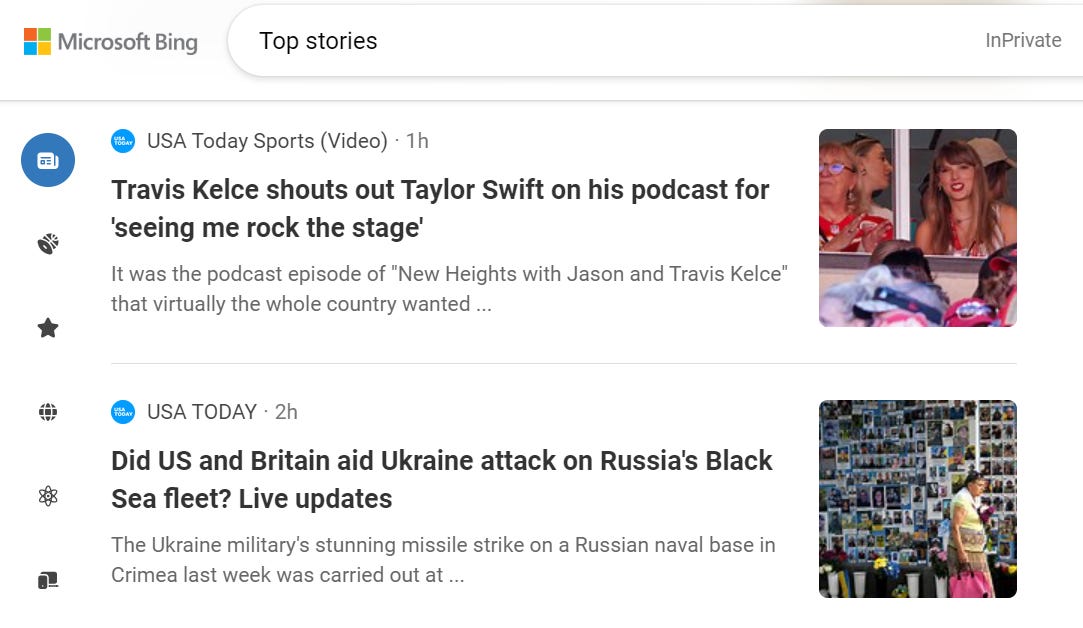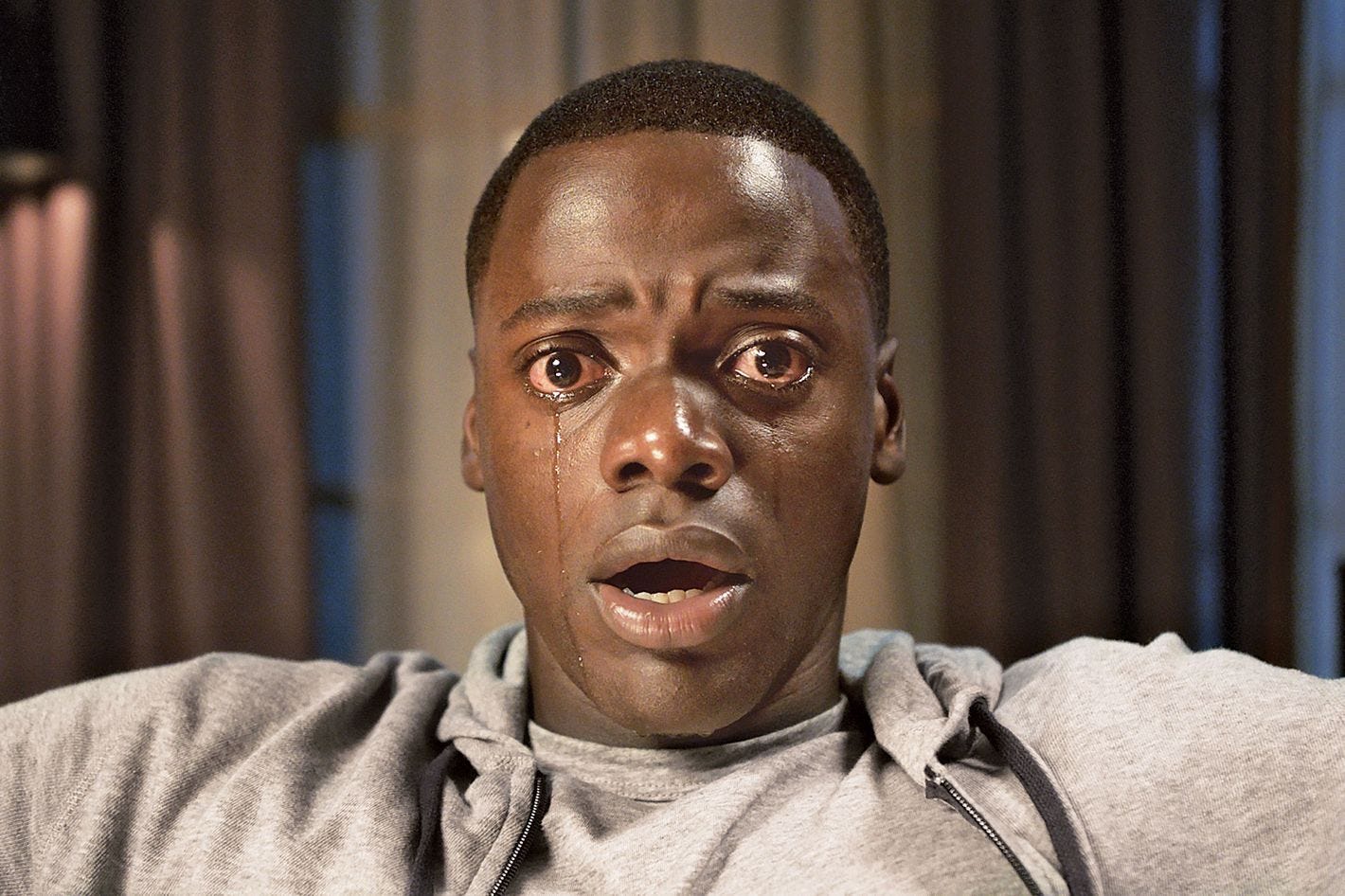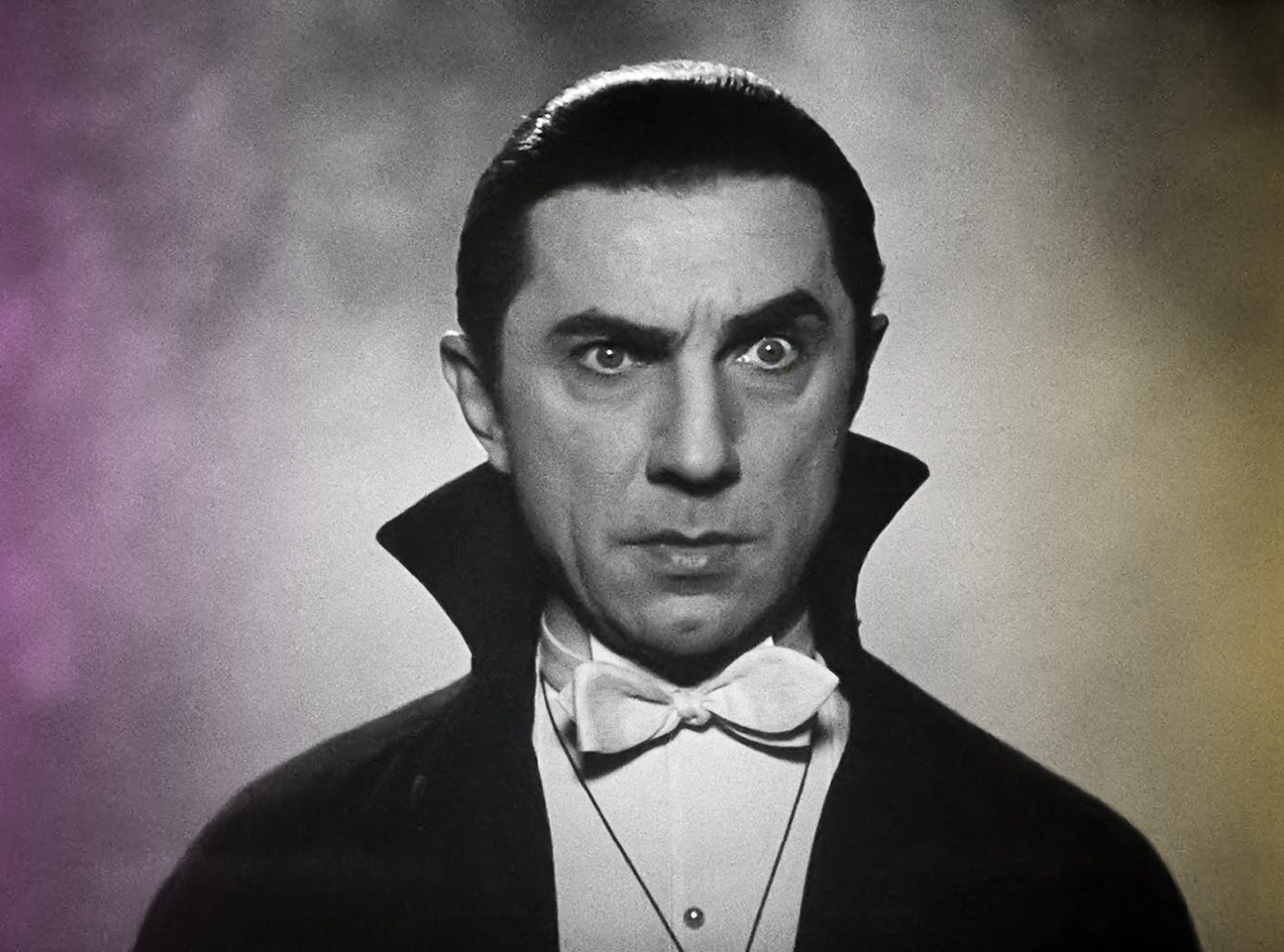In an age where Taylor Swift’s latest beau is reported with the same urgency as the Ukraine war, maintaining a healthy sense of moral proportion is like being the last Atlas in a world of Chicken Littles. By the time you take your lunch break, you have already had to wade through minefields of misinformation, stare down the death march of concept creep (click here for previous post about this), tune out the sweet nothings of a hundred advertisers, and pull away from the siren song of an algorithm who knows you better than your friends do.
And if this little soliloquy waxes a bit dramatic to you, it's probably because I have been thinking a lot about the relationship between fiction and reality lately. I blame my friend who heard that I was in a writing slump and suggested that I switch things up by reading Bram Stoker’s Dracula. Upon his recommendation, I bought a copy at Book Culture on 112th Street and ended up devouring it in a single weekend. Since then I’ve been on an endless horror binge and am currently on the last few chapters of Stephen King's The Shining. So when I say I’ve been contemplating fiction, I specifically mean horror fiction — and how an appreciation for this genre might be used to ward off moral distortion in the Information Age.
Before we begin this descent into the underworld, I want to clarify that I am not a horror aficionado and that the following is not meant to be a definitive commentary on the genre. I am, however, eager to know your thoughts and if this resonates, and I hope that you will share any insights you have in the comments below or through email. I probably raise more questions than give solid answers, but this is something I refuse to be ashamed of. Lastly, if you’re interested in some brief thoughts on Dracula, which I wrote for this newsletter but couldn’t find a place for, feel free to take a peek at my Goodreads. Now, on with the show…
What Good Writing Does Best
Ralph Waldo Emerson once noted how “fiction reveals truth that reality obscures.” This maxim expresses what many of us know intuitively but may have a hard time articulating; that fiction can be true even if it's not objectively real. Experience tells us that a good book can transcend entertainment to become something fiercely meaningful. Sometimes a great film can be more cathartic than testimony or historical account. As Nicole Kidman says in her irreproachable AMC intro:
“Our heroes feel like thе best part of us, and stories feel perfect and powerful.”
Tongue out of cheek, Kidman’s sentiment still stands. Fiction is able to inspire, move, motivate, and uplift — but these positive emotions are primarily associated with adventures, dramas, or hero myths. How do we make sense of those stories which elicit the opposite feelings? Feelings like fear, dread, terror, or paranoia? How do these stories reveal the truth obscured by reality?
I suggest you think of it like an eye exam. Do you know how the optometrist obstructs one eye in order to assess the other eye’s ability? Fantasy, sci-fi, and horror work similarly. By placing you in a dimension where the rules are strange and assumptions are impossible, fiction blocks that part of you which understands the world through a literal or myopic interpretation. The other eye — the eye of imagination — then gets full reign to amplify what the eye of realism had difficulty perceiving. By doing so it exposes the flaws, the cataracts, and the blind spots of the literalist eye. It reacquaints you with an old truth but through a fresh perspective. Neither eye is inherently better than the other, but using both eyes is certainly better than using one.
Horror Tropes or Horror Truths?
For example, as I’ve read these horror books I have been both amused and perplexed at practically every character’s ability to suppress their gut instinct and walk unwaveringly into foreboding circumstances. I don’t mean those moments of courage where a hero or heroine knows that danger is ahead but chooses to confront it for a worthwhile cause. I am talking about when the protagonist is getting a bad feeling about someone, then the locals start acting weird about that someone, and then the horse also freaks out about that someone, but they still choose to get in the carriage and hand over all belongings to that someone.
If analyzed through the eye of literalism, such cognitive dissonance can seem frustrating or unrealistic. But when viewed through the other eye, we see that our contempt for the characters might just be our own cognitive dissonance being projected onto the page. Sure — I may not know what it's like to physically climb into a death carriage, but I do know what it's like to sit silently in the proverbial passenger seat while my internal voice is screaming, “this is going to end badly.” In the real world I can justify such behavior by saying that it's polite or keeping the peace, but fiction exposes it as both servile and foolish.
Or call to mind another familiar trope. It’s late in the night and our protagonist is home alone when the phone suddenly rings. From the other side comes a chilling and sinister voice dripping with ill intent. Halfway through the dialogue (which consists primarily of “who is this!?” and “what do you want?!”) the protagonist realizes — the call is coming from inside the house!
This borderline banal scenario is more than just a reminder to buy a ©Ring System and ©ADT lawn sign. It is a parable meant to challenge our confidence in safe spaces. It speaks to the futility of total control and highlights our tendency to banish danger as a phenomenon that only emerges externally: from outside governments, outside foreigners, or people outside of my tribe. But in Fictionworld, characters are rarely afforded such convenient delusions. The killer is already upstairs and waiting. The phone call trope reminds us that the most frightening possibility is the possibility of an inside job: my government, my political party, my friends, my family, my tribe… or maybe just me. Not always, but sometimes.
I don’t want to get too carried away with this type of abstraction, however. While it is fun (at least for me), this style of interpretation can be done with practically any genre of creative writing. The question I’m asking is, “what is the horror genre’s unique contribution to the world of fiction?”
The Unique Contribution of Horror
Flannery O’ Conner, one of history’s most renowned gothic authors, has some valuable insight. O’Conner was frequently lambasted by her critics for writing books that were too violent and too chthonic. This bothered O’Conner and she explained the following in a letter to her friend:
…when I see these stories described as horror stories I am always amused because the reviewer always has hold of the wrong horror.
The wrong horror.
O’Conner’s statement reminds us that there is more than one kind of horror in stories like Dracula or The Shining. There is the fantastic and supranatural horror: the undead, the mind control, the shapeshifting, or the monsters. In O’Conner’s mind, this is the wrong horror to be priggish about. The other horror — the truly intolerable stuff — is the lying, the cheating, the abusing, and the malfeasance. In the course of modern life, these are the everyday realities which cajole us into mindless apathy. Between our personal problems, the deleterious influence of technocracy, and just the regular ocean of general “bad vibes” all around us, it is easy to sink into willful blindness. Yet like the scenes in scary movies where you throw your hands in front of your face but still watch through the spaces between your fingers — the horror author excels in anchoring our gaze on things we want to look away from.
Writers smuggle the right horror into your consciousness by wrapping it in cloaks of the wrong horror. Stoker drives you wild with the fear that Lucy will invite Dracula into her house, but he does so to remind you that real villains don’t ask for permission. He breaks your heart with news that Mina’s illness can only be cured by killing the dark lord, but only to provoke the memory that some illnesses have no cure at all. A crucifix may ward off the Count, but real crooks will just as soon use that cross as cover for their crimes. And just when you begin to pity Van Helsing for being outside when the sun sets, you remember that true villains don’t care what time of day it is.
Yes — real monsters don’t transform into bats, cast spells, or fly through the sky; but real monsters nonetheless break laws which we thought were unbreakable. Not just the laws that are established through legislation, but the deeper laws which, when abided by, give us a sense that we are more than mere dirt and stardust. Laws such as the supremacy of mercy, the right to dignity, the power of kindness, or the sacredness of trust. These are the laws which we think could be momentarily bent — but never did we think that they could be broken! And we certainly did not believe that they could be broken without conscience.
But you only believed this because you are not a monster.
And when your heart is grieved by these atrocities more than it is afraid of ghosts and ghouls — and when treachery startles you more than the sight of black pots and broomsticks — then you can say that the author has done their best work. Then you can say that you have finally laid hold of the right horror. A horror that is just as true and in no way contradictory to the idealism of the hero’s journey. In fact, horror only exalts the journey. For in the same way that the heroine’s journey shows us courage in the face of evil; horror teaches us to discern evil and reminds us why a hero needs such immense courage to begin with.
Thanks for reading, friends! Until next time…









